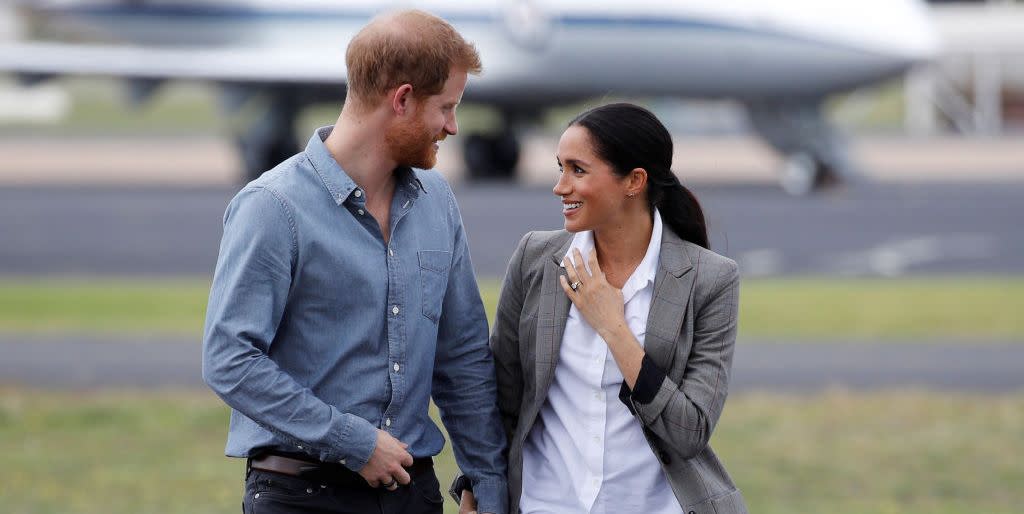Meghan Markle on How Prince Harry Helped Her at Her "Worst Point"

Meghan Markle praised her husband, Prince Harry, on the latest episode of her Archetypes podcast.
Actress Constance Wu, comedian and writer Jenny Slate, and activist and Bollywood star Deepika Padukone joined the Duchess of Sussex in the Tuesday episode, titled "The Decoding of Crazy."
In the intro, Duchess Meghan said, "I feel pretty strongly about this word… this label: 'crazy'… the way that it's thrown around so casually and the damage it's wrought on society and women everywhere — from relationships to families being shattered, reputations destroyed and careers ruined."
She added that the stigma surrounding the word has a silencing effect—"this effect where women experiencing real mental health issues, they get scared, they stay quiet, they internalize and repress for far too long."
The clip comes after World Mental Health Day, which falls on October 10.
On the podcast, Meghan spoke of her own mental health struggles and experience with the stigma. She described how Prince Harry found her a referral to a mental health professional when she was at her "worst point."
"I mean, I think at my worst point, being finally connected to someone that, you know, my husband had found a referral for me to call. And I called this woman," Meghan said. "She didn't know I was even calling her. And she was checking out at the grocery store. I could hear the little beep, beep, and I was like, 'Hi,' and I'm introducing myself and that you can literally you're going, wait, sorry. I'm just. Who is this? Um, and saying I need help. And she could hear the dire state that I was in."
Meghan continued, "But I think it's for all of us to be really honest about what it is that you need and to not be afraid to make peace with that, to ask for it."
Though she didn't provide more details about her experience, Meghan previously addressed, in her interview with Oprah Winfrey, the mental health issues she faced after marrying Harry and becoming a senior member of the royal family, and said that at one point, she "didn't want to be alive anymore."
Deepika said her mental health problems began in 2014, and came "out of the blue."
"I woke up one morning and everything was going well. My films were a success. Personally, beautiful relationships, supportive family. Like it just sort of came out of the blue. I woke up, I fell. I — you know, my blood pressure dropped. And then the next thing I know. My life just felt meaningless," Deepika said. "I didn't want to live anymore you know, I just. I didn't want to get out of bed. And I struggled with this for, for many, many months. I would just break down at the drop of a hat. Not be present. Like I'd be talking to someone or be, you know, be at an event or be engaging with someone, but, like, my mind's somewhere else. And I'd, I'd never felt like that before. So just, all of it just felt like, so disorienting. And my parents were visiting me and the day they were ready to leave, I was sitting and watching them pack and I started crying again. And my mom was like, 'What's wrong? Is it your relationship? Has someone said something to you?' I said, 'I don't know. I've been feeling like this for many, many months. I just keep crying. I don't know why.' It's feeling of hopelessness. You just feel hopeless. You feel like there's no point in living."
Eventually, Deepika shared her story on TV in India, and she was applauded for her honesty and bravery.
"I mean, there's two parts to this," she said. "One is: I think where people struggle the most, especially in India, where there's so much stigma attached to mental illness. One is creating the awareness. Most of us don't even know that we're struggling with mental illness. And second, if we are, to destigmatize it, to let people know that it's okay to seek help and to let caregivers know that it's okay for someone to go through this. It's the same way we have physical ailments. Our mind is very much a part of our body. But somehow, when it comes to mental illness, we start treating our minds like outside of our bodies."
Meghan replied, "You're right. You know, my husband works a lot in, with the military community as a veteran and invisible injuries—they call them that all the time. Right. If you suffer from post-traumatic stress, it's the thing that you can't see. And if you can't see it, it is just either ignored or brushed under the carpet."
Meghan and Harry have long been advocates for mental health awareness and treatment, and the Duke of Sussex himself has said he speaks to a life coach to work on his mental fitness.
You Might Also Like
